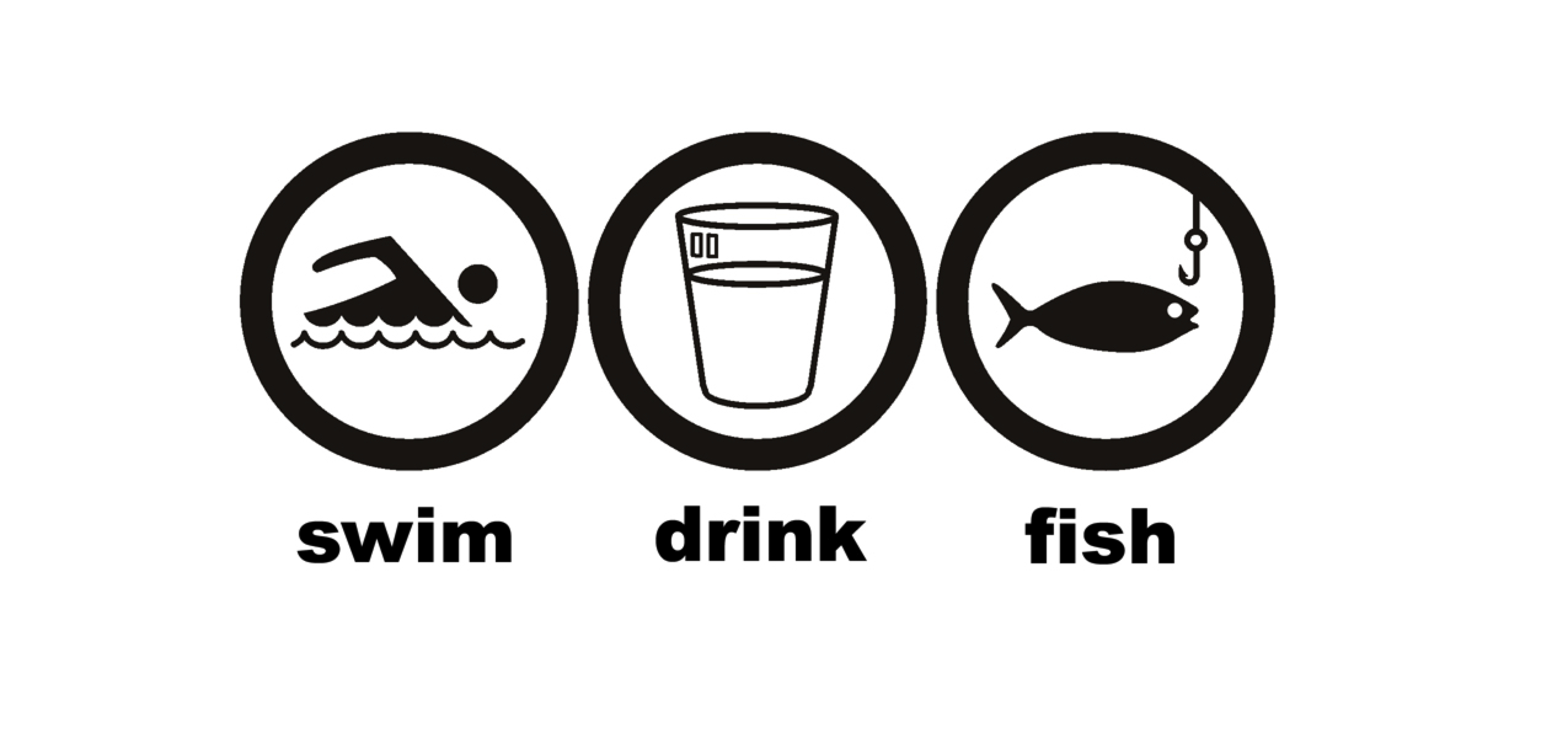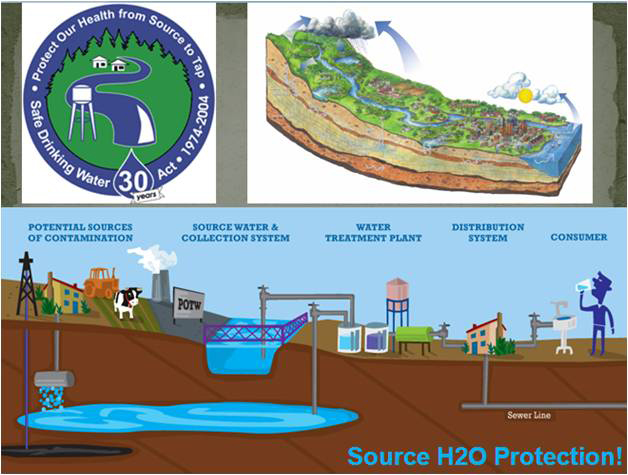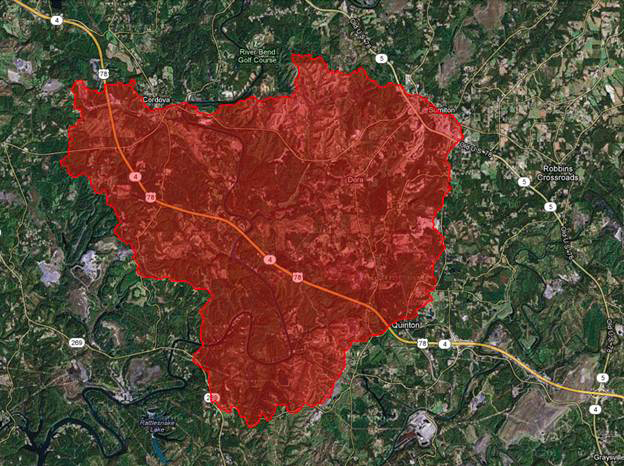Lands Unsuitable for Mining
Lands Unsuitable for Mining Petition
Help us Prevent Coal Mines Upstream of a Birmingham Water Source
Black Warrior Riverkeeper filed a Petition on September 10, 2012 with the Alabama Surface Mining Commission (ASMC) to designate areas adjacent to the Birmingham Water Works Board’s Mulberry Fork drinking water intake as lands unsuitable for coal mining. The petition opens another front in Black Warrior Riverkeeper’s ongoing fight to stop coal mining upstream of the public water intake facility that supplies water daily to around 200,000 Birmingham-area residents. The petition seeks to designate 58,544 acres of land adjacent to the Mulberry Fork of the Black Warrior River in Walker County just northwest of Birmingham, where drinking water is pumped out of the river, as off limits to coal mining.
- Reasons those 58,544 acres should be off-limits to mining:
- 1. the need to protect drinking water sources, which was demonstrated scientifically by the Birmingham Water Works Board and others during recent coal mine permit application processes, documenting the known and substantiated concerns about the impact of surface mining on source drinking water quality;
- 2. the undisputed fact that the permitting of additional mines in the Mulberry Fork watershed will lead to a continued decline in source water quality;
- 3. the Birmingham Water Works Board has established for the record that the Mulberry Fork drinking water source is the most difficult to treat and that an ADEM study reveals that this area of the river contains increased sediment loads;
- 4. more mining contributes more sediment to source water, which necessitates more treatment;
- 5. eventually a decline in source drinking water quality can lead to increased treatment costs for ratepayers, when many of them are struggling to pay existing rates;
- 6. increased iron and manganese in drinking water means that the water might not taste good enough to use or drink or cook with, as well as may stain clothes and plumbing fixtures;
- 7. the ASMC cannot dismiss concerns about secondary Maximum Contaminant Levels for taste and staining as mere “aesthetics,” because they may mean the water will be less desirable or cost more for its primary purposes of drinking and household use;
- 8. many businesses also rely on clean, safe affordable drinking water from the Mulberry Fork to serve at their establishments or to use to provide goods, products and services;
- 9. the ASMC cannot dismiss concerns about secondary MCLs, taste and staining as mere “aesthetics,” because it may mean that the water is less desirable or more expensive for consumers and businesses to use;
- 10. in view of the established relationship between degradation of source water quality and increased treatment costs or decreased utility as drinking water, it is neither equitable nor appropriate for the coal industry to make consumers and businesses pay increased costs for clean, safe drinking water;
- 11. the ASMC has the legislative duty, particularly in the absence of protective zoning requirements that might otherwise address the issue, to carefully strike the balance between the need for coal and the need for source drinking water protection by making sensitive and unique areas of the Mulberry Fork watershed near the Mulberry Intake off limits for mining;
- 12. the intent and purpose of the Surface Mining Control and Reclamation Act of 1977 (SMCRA) was to establish a nationwide environmental and land use program designed to protect society and the environment from the adverse effects of surface coal mining operations. While the primary focus of the ASMC may be to determine where and under what circumstances mining may be appropriate (the permitting process), just as important to the ASMC’s execution of its statutory duties is to determine where mining is not appropriate or unsuitable under SMCRA, as when mining will negatively affect a public water supply.
- 13. lands near and that drain to the Mulberry Fork source drinking water are unsuitable for mining and should be protected as such.


LUM Petition & Exhibits
BWRk_LUM_PetitionAndExhibits.pdf
On January 31, BWRk made its public case to designate the lands around the BWWB’s drinking water intake as unsuitable for mining by filing these detailed comments.

Black Warrior Riverkeeper has asked the ASMC to designate the area highlighted in red as off-limits to surface coal mining. Map created by John Kinney with data from: http://www.surface-mining.state.al.us/page3.html To view map online,click here.
Description of the LUM Petition Process:
- 1) Black Warrior Riverkeeper filed a Lands Unsuitable for Mining Petition with the Alabama Surface Mining Commission (ASMC) on September 10, 2012.
- 2) LUM Petition accepted by ASMC as complete on October 9, 2012.
- 3) ASMC sent a public notice to stakeholders on October 24, 2012 starting the public comment process, which ends on January 31, 2013.
- 4) ASMC will hold a Public Hearing approximately 60 days after the close of the public comment period.
- 5) ASMC will consider all information submitted during the public comment process and public hearing, and will release a final written decision (with reasons) within 60 days of the public hearing.
In the LUM petition process, there is no burden of proof. The process is intended to be legislative in nature and emphasizes fact finding. This is a real difference (and advantage) over the adversarial permit appeal system, which artificially assigns burdens of proof that can sometimes skew outcomes.
Instead, the ASMC is charged with making a factual finding as to whether the lands at issue are “suitable” for mining or whether mining here could endanger a public resource, which is used for recreation, fishing, swimming, and drinking water. Differing from the administrative permitting process, the LUM process affords the ASMC an opportunity to think prospectively about whether it is appropriate to mine in certain areas or whether, because of sound scientific evidence, mining should be “off limits” in certain sensitive places.
Unfortunately, in past permitting decisions the Alabama Surface Mining Commission and the Alabama Department of Environmental Management have indicated that they think it is okay to allow surface coal mining adjacent to and upstream of this drinking water supply. They contend that wastewater discharges from the mine will not negatively impact streams, wetlands, the river, aquatic life, fishing, swimming, source water, or tap water.
This is our opportunity to set the record straight and give them enough information to make the right decision.
Background information about our LUM Petition:
Black Warrior Riverkeeper filed the Petition on September 10, 2012 with the Alabama Surface Mining Commission (ASMC) to designate areas adjacent to the Birmingham Water Works Board’s Mulberry Fork drinking water intake as lands unsuitable for coal mining. The petition opens another front in Black Warrior Riverkeeper’s ongoing fight to stop coal mining upstream of the public water intake facility that supplies water daily to around 200,000 Birmingham-area residents.
According to Riverkeeper Nelson Brooke, the goal of the petition is to protect an important resource: clean, safe and affordable drinking water. “Protecting the source of our drinking water, the Mulberry Fork of the Black Warrior River, is the most cost and resource effective way to provide clean drinking water now and in the future. It makes absolutely no sense for the state to issue permits to pollute the source of our drinking water, so that drinking water customers can then pay to clean up a polluter’s mess.”
Staff attorney Eva Dillard explains, “The Birmingham region has invested substantially in the Mulberry Fork intake and we want to preserve and protect that investment. We believe that the drinking water supplied by the Mulberry Fork represents a unique, site-specific resource. Continuing to permit surface coal mining operations near the Mulberry Fork puts that investment, not to mention the public heath, at risk.”
Areas that affect renewable resource lands where coal mining could result in a substantial loss or reduction of long-range productivity of water supply are eligible for designation as lands unsuitable for mining. Renewable resource lands are defined as geographic areas, like the Mulberry Fork and surrounding lands, which contribute significantly to the long-range productivity of water supply.
Previously, Riverkeeper has focused on raising public awareness about the proposed Shepherd Bend and Reed Minerals No. 5 mines, both of which would discharge upstream of the Mulberry Fork intake. In reference to both mine proposals, the Birmingham Water Works Board has publicly commented, “We are concerned that this proposed mine has the potential to adversely impact the Birmingham area drinking water.” The University of Alabama System Trustees have not yet decided whether they will lease or sell the System’s significant property for the Shepherd Bend Mine.
The LUM Petition represents an additional, comprehensive strategy to protect drinking water beyond the threat of individual mines; the ultimate goal is to make a preventive determination of where coal mining can safely occur and not harm the Mulberry Fork public drinking water supply. Coal mining is known to contribute heavy metals (including iron, manganese arsenic and lead), sediment, and other pollutants to drinking water sources, which leads to greater demands on treatment operations as well as increased treatment costs. Added filtration costs are typically passed on to Birmingham Water Works Board drinking water customers.
Documents
Pictures, maps, and information about the proposed Reed Minerals No. 5 Mine
http://blackwarriorriver.org/news/reed-mine-proposal-on-mulberry-fork
Pictures, maps, and information about the proposed Shepherd Bend Mine
http://blackwarriorriver.org/shepherdbendmine
Birmingham Water Works Board’s Source Water Assessment Program: Mulberry Fork
http://www.blackwarriorriver.org/pdf/BWWB%20Source%20Water%20Assessment%20Program%20Mulberry%20Fork%202007.pdf
Birmingham Water Works Board’s Intervention and Petition to the ASMC regarding Lands Unsuitable for Mining (1/31/2012):
http://www.blackwarriorriver.org/pdf/BWWB%20LUM%20Intervention%20and%20Petition.pdf
Birmingham Water Works Board’s Public Comments to the ASMC regarding Lands Unsuitable for Mining (1/31/2013):
http://www.blackwarriorriver.org/pdf/BWWB%20LUM%20Letter.pdf
Ruffner Mountain Nature Preserve’s Conservation Land Manager’s Public Comments to the ASMC regarding Lands Unsuitable for Mining (1/29/2013)
http://www.blackwarriorriver.org/pdf/NickBieser-Ruffner.LUMletter-ASMC_1.29.13.pdf
Samford Biologist Dr. Betsy Dobbins’ Public Comments to the ASMC regarding Lands Unsuitable for Mining (1/29/2013)
http://www.blackwarriorriver.org/pdf/Dobbins_Letter%20to%20ASMC_LUM_Jan%202013.pdf
NewFields Engineer Warner Golden’s Public Comments to the ASMC regarding Lands Unsuitable for Mining (1/29/2013)
http://www.blackwarriorriver.org/pdf/NewFields%20Letter%20LUM%20Jan%2025%202013.pdf
Wastewater/Water Treatment Operations Manager Kevin Begin’s Public Comments to the ASMC regarding Lands Unsuitable for Mining (1/29/2013):
http://www.blackwarriorriver.org/pdf/Begin%20LUM%20letter%20to%20ASMC.pdf
UA Chemistry Professor Shane Street’s Public Comments to the ASMC regarding Lands Unsuitable for Mining (1/29/2013)
http://www.blackwarriorriver.org/pdf/LUM%20BWRk%20Street%2028%20Jan%202013.pdf
UA Biology Professor Art Benke’s Public Comments to the ASMC regarding Lands Unsuitable for Mining (1/29/2013)
http://www.blackwarriorriver.org/pdf/Benke%20LUM%20letter%20to%20ASMC.pdf
Tennessee Aquarium Biologist Dr. Bernard Kuhajda’s Public Comments to the ASMC regarding Lands Unsuitable for Mining (1/22/2013)
http://www.blackwarriorriver.org/pdf/Dr.BernardKuhajda-TNAquarium.LUMletter-ASMC_1.22.13.pdf
UAB Biology Professor Rob Angus’ Public Comments to the ASMC regarding Lands Unsuitable for Mining (1/20/2013):
http://www.blackwarriorriver.org/pdf/Dr.%20Angus%20to%20ASMC%20re%20LUM.pdf
UAB Environmental Health Sciences Assistant Professor Dr. Julia Gohlke’s Public Comments to the ASMC regarding Lands Unsuitable for Mining (1/12/2013):
http://www.blackwarriorriver.org/pdf/Dr%20JuliaGohlke%20LUM-letter_1%2012%2013.pdf












